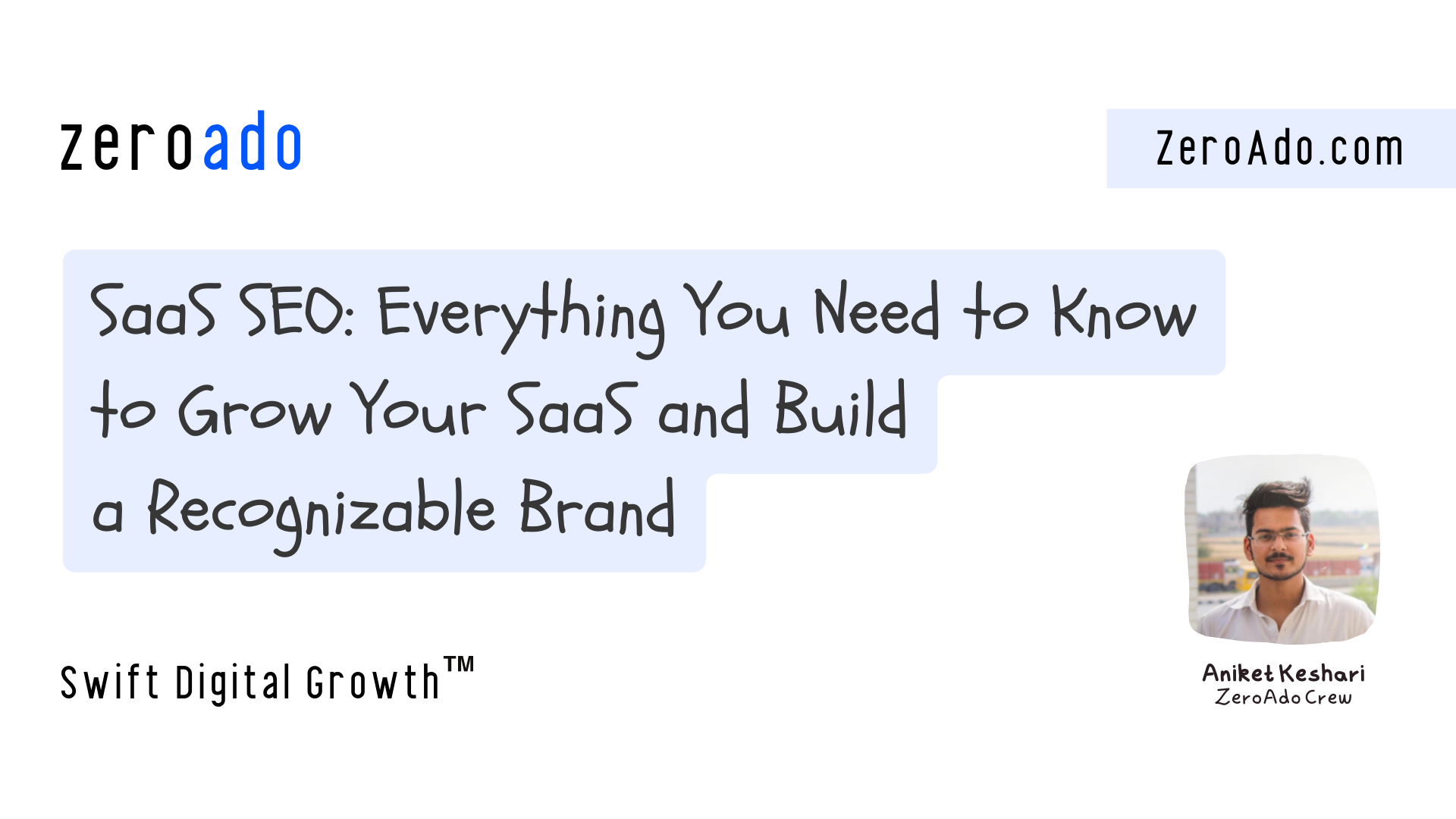The SaaS (software as a service) industry is growing at an extraordinary rate, with the global SaaS market expected to reach $295.08 billion U.S. dollars by 2026, up from $148.75 billion in 2021.
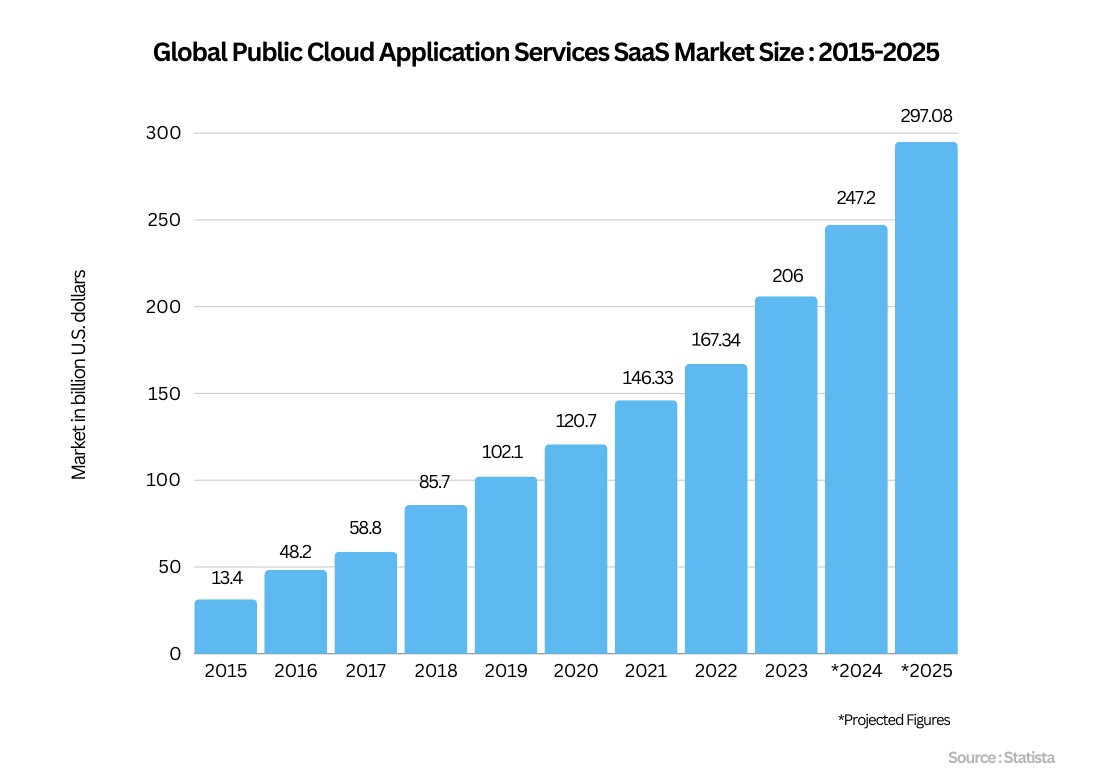
SaaS solutions are really becoming a must-have for businesses everywhere, especially for B2B companies, as they make workflows easier and improve productivity.
Big players in the SaaS space like Salesforce, HubSpot, and Zoom have used SaaS SEO to their advantage, they’re all about building solid search engine visibility.
For instance, Salesforce serves over 150,000 customers, HubSpot has over 150,000 active users, and Zoom has seen over 300 million daily meeting participants at its peak. They’ve invested in SaaS SEO agencies to make sure they stay highly visible in search results, which has been key in keeping them competitive.
However, with more than 15,000 SaaS companies worldwide, competition is intense. For any new SaaS company trying to break through, strong SEO is no longer optional—it’s essential. To effectively compete, SaaS companies need to adopt the right SEO strategies to reach the right audience. This means creating relevant content, building visibility, and using the best SaaS marketing agencies to implement proven tactics that help you stand out to potential clients.
Don’t worry—we’ll cover it all in this blog!
- What is SaaS SEO?
- Why SaaS SEO is essential for driving sustainable business growth [plus examples from top SaaS brands]
- Understanding ToFu, MoFu, and BoFu in SaaS SEO
- How SaaS SEO work with other SaaS Marketing and Growth channels?
- How to build a SaaS SEO strategy?
- Define your goals
- Understand your customer personas
- Look for competitors and analyze their strategies
- Create a keyword lists and conduct keyword research
- Create and optimize content better than your competitors
- Check for on-page SEO and Technical SEO
- Build high-quality backlinks
- Use SEO tools to track and improve
- Rank tracking, monitoring, and constantly making updates
- Few more bonus steps to level up your SaaS SEO
- Start building your SaaS SEO strategy and make your SaaS business stand out
- Frequently asked questions – SaaS SEO
- What are the best SaaS SEO strategies?
- How to do SEO marketing for a SaaS business?
- What kind of SEO approach and strategy should I use in a B2B SaaS platform?
- What SEO tactics do you use to increase the traffic to your B2B SaaS website?
- How do I find some good SaaS SEO recommendations?
- What is a good SEO tip for SaaS companies?
- What SEO strategies have you found most effective for SaaS growth?
- How important is SEO in a SaaS business?
- How to improve SEO for SaaS companies?
What is SaaS SEO?
SaaS SEO is the process of optimizing your SaaS website to improve its visibility in search engine results. This approach helps you attract organic traffic, generate leads, and engage potential customers by targeting relevant keywords and creating SEO-friendly content that addresses their needs and interests.
Unlike traditional SEO, SEO for SaaS isn’t just about increasing general traffic, it’s about reaching people who are actively searching for software solutions that your SaaS company provides.
This involves several SEO strategies such as conducting keyword research, updating website content, technical SEO (optimizing your website for users and search engines), link-building (links from other websites that point to your site), and others (which will be discussed in detail later in this blog).
I believe you’re getting the idea! Let’s talk more.
Why SaaS SEO is essential for driving sustainable business growth [plus examples from top SaaS brands]
You might be doing good with your SaaS company but for great, real, long-term growth, SaaS SEO can make a huge difference.
You can think of it like building a house: you could throw up a quick structure that’s easy and fast, but if you want it to last and withstand challenges, you need a strong foundation. SaaS SEO is that foundation. It may take time and effort to build, but once it’s there, it supports everything you do, helping you stand strong in a competitive market.
Let’s see some key ways SaaS SEO can help you build a strong foundation for your SaaS business.
Increase your business’s online visibility
With SaaS SEO, you make it easy for people to find your business on search engines. Because it is something where most people start their search for solutions.
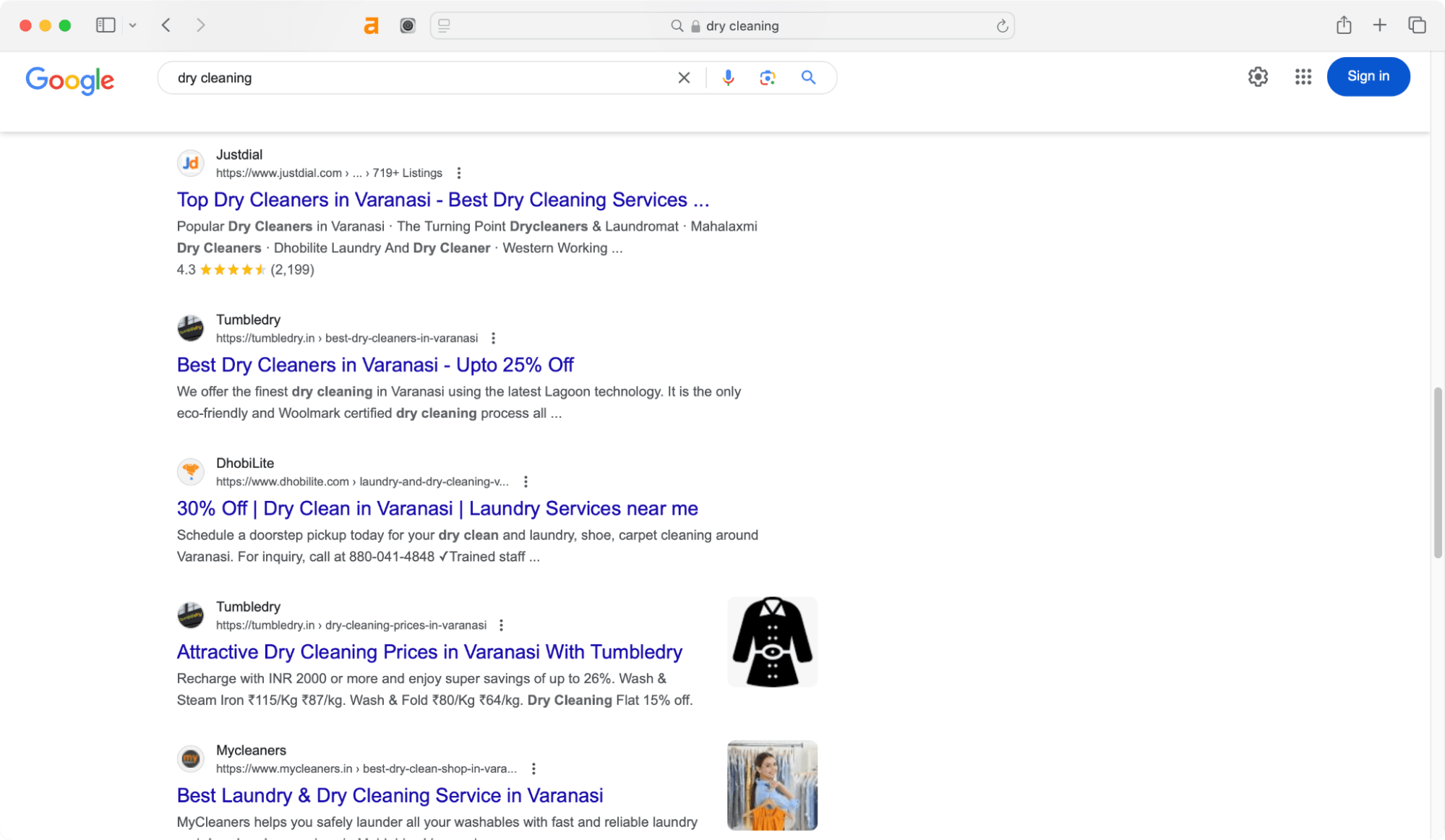
For example, if you’re wearing branded clothes and need a dry cleaner. You might search for some “dry cleaning” related words on Google. This raises the opportunity for the dry cleaning businesses to use SEO to rank at the top and become visible to you.
The same goes for SaaS companies—higher visibility in search results means more chances for potential customers to discover your brand, which is essential in such a competitive market.
Attract the right audience
SEO is not about ranking for just any keyword; it’s about ranking for the keywords that matter to your business.
Neil Patel, SEO Expert
The above quote truly reflects the essence of SaaS SEO. It’s not about attracting just anyone, but about attracting the right people. When you optimize your website with the right keywords and content that addresses the needs of your target audience, you’re engaging directly with those who are actively looking for solutions like yours.
This focused approach helps ensure your efforts lead to meaningful results, whether it’s gaining visibility, generating leads, or increasing conversions.
Build trust and authority with search engines and users
Ranking well in search results builds your credibility with both search engines and potential customers. When users see your content ranking highly, they’re more likely to trust your brand as a reliable source in your industry. Over time, this authority helps solidify your brand’s reputation as a top player.
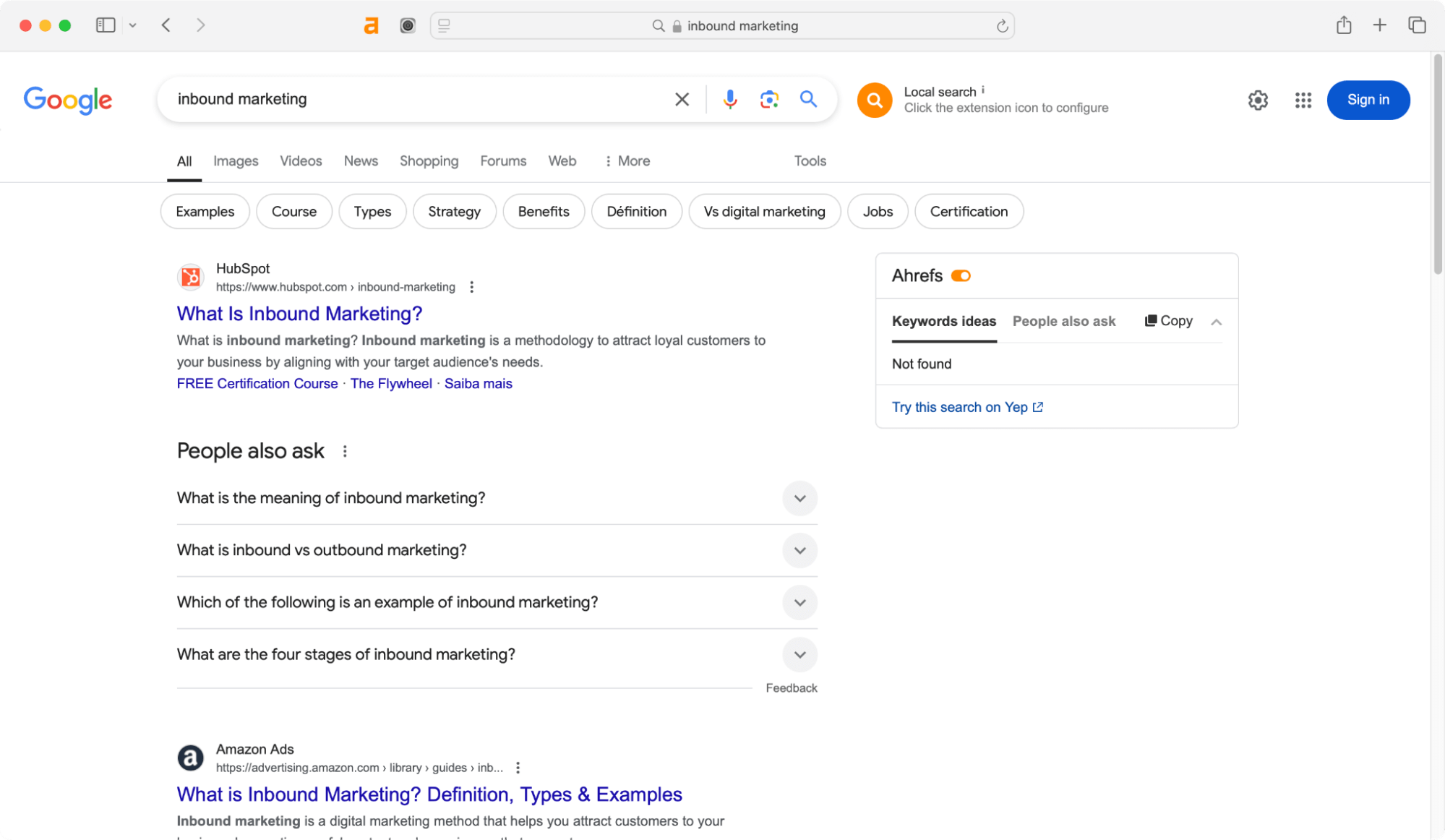
A great example of this is Hubspot, a popular SaaS marketing tool. HubSpot ranks at the top for keywords like “inbound marketing” and “CRM software.” Because of this strong ranking, people trust HubSpot more when they see its content in search results.
This trust has helped HubSpot grow and gain over 150,000 customers. By ranking well in search results, HubSpot has built a strong reputation and become a leader in its industry.
Generate organic leads
You’ve probably noticed the word “sponsored” at the top of search results when you Google something. These are paid ads, where businesses spend money each time someone clicks on their ad.
But here’s the thing: SEO works differently. Instead of paying for every click, SEO brings in organic traffic that doesn’t rely on constant ad spending. This means visitors can find your website naturally through search engines.
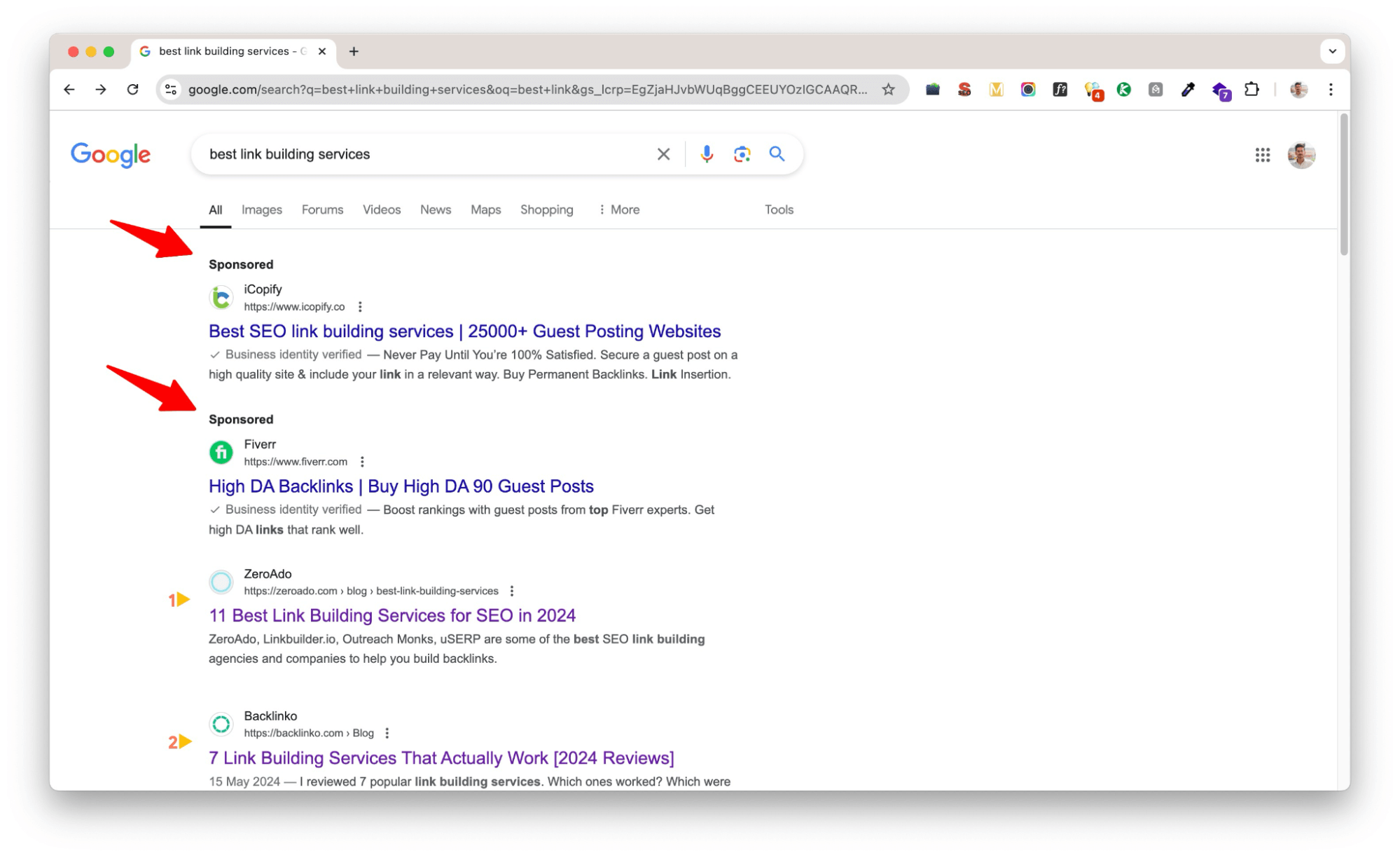
For example, when I searched for “best link building services”, I saw two sponsored ads at the top, but the first organic result was a blog from ZeroAdo. This means ZeroAdo doesn’t pay for each click or visit they get. It’s like having a steady stream of leads without the ongoing cost of ads.
All you need to do is make your content rank organically, and it will continue to bring traffic without extra effort or spending—unlike ads, which stop once the budget runs out. SEO helps you build a reliable, long-term flow of leads, reducing the need for constant ad spend and saving you money in the long run.
Increase conversion rate and business revenue
Since you’re attracting visitors who are genuinely interested in your product, these leads are often more likely to convert. Quality traffic from SEO means higher conversion rates and, ultimately, more revenue for your business.
Reduce customer acquisition costs (CAC)
As we mentioned earlier under “generate organic leads”, SaaS SEO can greatly reduce your customer acquisition cost (CAC). By attracting organic traffic and qualified leads, you can avoid relying solely on expensive paid ads. This keeps your customer acquisition costs more manageable and sustainable as your business grows.
Gain a competitive advantage over your competitors
SEO helps you stay ahead of competitors by increasing your presence on search engines. When customers see your brand consistently ranking above others, it gives you an edge.
Just like ZeroAdo gains a competitive advantage over other SEO agencies in the link-building services space, a strong SEO strategy not only boosts your visibility but also positions you as a leader in your field.
Now, let’s talk about ToFu, MoFu, and BoFu. I know what you’re thinking—are these dish names? But no, they aren’t! Let’s clear that up.
Understanding ToFu, MoFu, and BoFu in SaaS SEO
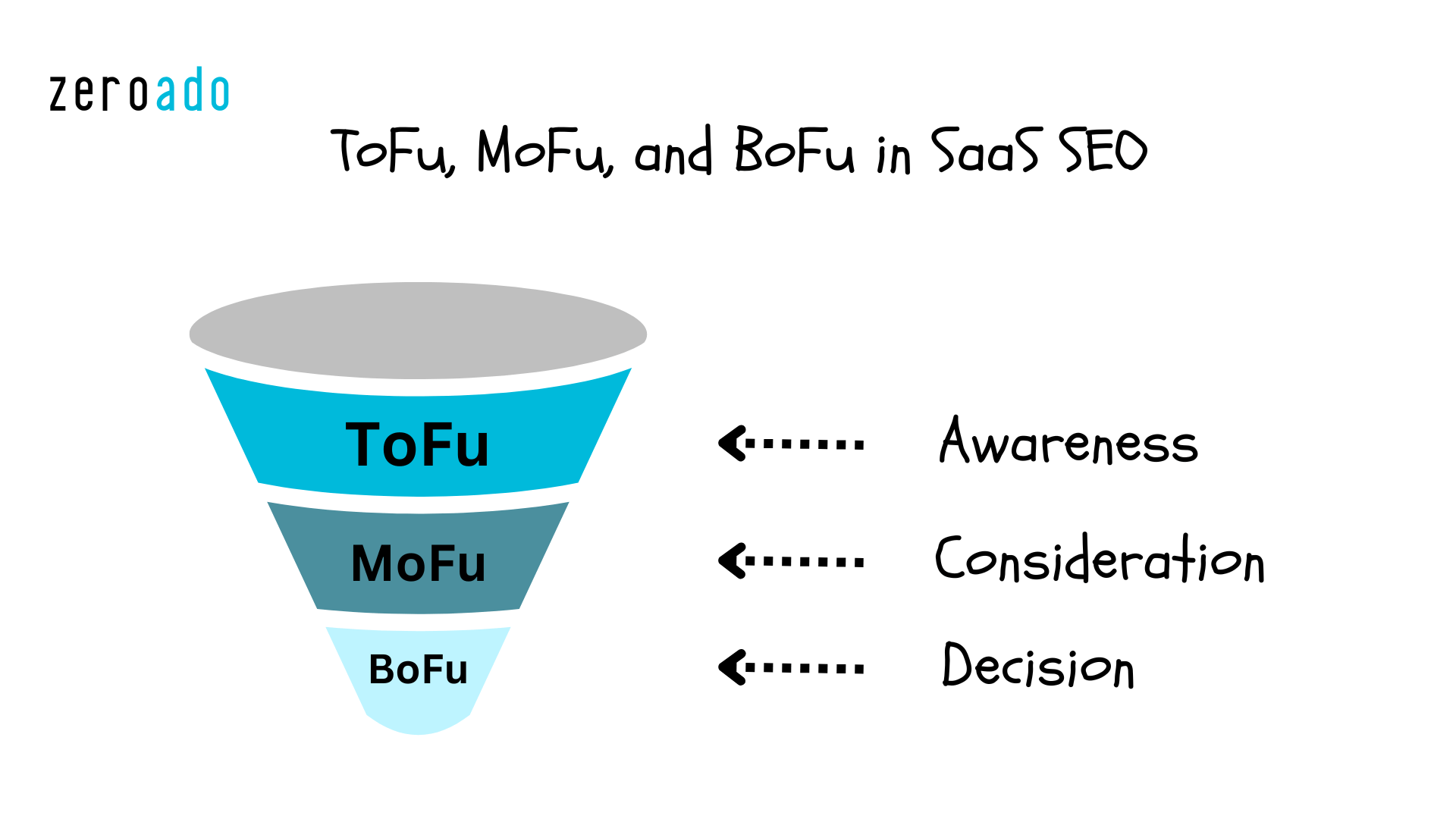
ToFu, MoFu, and BoFu stand for Top of Funnel (ToFu), Middle of Funnel (MoFu), and Bottom of Funnel (BoFu). These terms refer to different stages in a customer’s journey with your product, especially in marketing and sales.
- ToFu (Top of Funnel): This is where you attract people who might not know much about your product yet. They’re just starting to search for information or solutions. Content at this stage should be broad and informative, like blog posts, guides, or infographics.
- MoFu (Middle of Funnel): Here, people are more aware of what they need and are considering different solutions. This is the stage where they’re looking for details, comparisons, and perhaps a demo or trial. Publishing case studies, versus blogs, and product comparisons are great for MoFu.
- BoFu (Bottom of Funnel): By this point, potential customers are close to making a decision. They know your product and are evaluating if it’s the right fit. Content like testimonials, free trials, and special offers can help them take that final step.
Using ToFu, MoFu, and BoFu in your SaaS SEO strategy makes sure you’re reaching customers with the right information at each stage of their journey, so they keep moving closer to signing up or purchasing!
How SaaS SEO work with other SaaS Marketing and Growth channels?
SaaS SEO doesn’t work alone. It actually amplifies and supports other marketing and growth efforts, creating a strong, interconnected strategy. Let me give you a quick breakdown of how it all connects:
Content marketing
SEO drives organic traffic to the valuable content you create, like blog posts, guides, and case studies. When you optimize content for search engines, you’re not only reaching a wider audience but also building authority and trust with your readers.
Paid ads (PPC)
While PPC brings in instant traffic, SEO is a long-term play. By combining both, you’re capturing leads in the short term while building organic traffic that can sustain growth over time, reducing reliance on paid ads.
Social media
Your social media efforts can drive traffic to your SEO-optimized content, helping it reach even more people. Plus, social shares and engagement can contribute indirectly to SEO by signaling search engines that your content is valuable.
Email marketing
SEO can help grow your email list by attracting users who are interested in your content and willing to subscribe for updates. This way, your email marketing becomes more targeted, with a higher chance of conversions.
Affiliate marketing
Affiliates can link to your SaaS website, driving both referral traffic and SEO benefits. These SEO backlinks help boost your authority in search engines and increase organic visibility over time.
Product marketing and sales enablement
SEO and content work closely to educate potential customers and move them along the funnel. From ToFu to BoFu, SEO-optimized content ensures that sales enablement materials are seen by the right audience.
Partnerships and influencer marketing
When partners or influencers link to your site, it not only brings in new traffic but also boosts your SEO. Backlinks from credible sources help search engines trust your site more, pushing you up in rankings.
Now, let’s move on to the most important part of this blog.
How to build a SaaS SEO strategy?
In this section I’ll walk you through the core SaaS SEO strategies that can help your SaaS business build visibility, connect with the right audience, and ultimately drive growth. Let’s get started.
Define your goals
Before diving into SEO, it’s critical to set clear, measurable goals. Define what success looks like for your SaaS business. Are you aiming to increase organic traffic, generate leads, boost conversions, or raise brand awareness?
Setting specific goals helps you stay focused and allows you to measure the impact of your efforts. Knowing your goals will also help shape other parts of your strategy, like which keywords to focus on or the type of SEO content to create.
Understand your customer personas
Get to know the people who would benefit most from your software. Create customer personas that capture details like job roles, industries, challenges, and goals. This will help you create content that resonates with your target audience and addresses their needs.
When you understand who you’re targeting, you’ll be able to choose keywords and topics that genuinely interest and attract them, making your SEO efforts more effective.
A great example of understanding and using customer personas effectively is Nike. Even though Nike is not a SaaS company, their approach to creating and customizing content for specific personas offers valuable insights that SaaS companies can apply.
Nike has developed distinct customer personas to target their content and products based on different segments of their customer base. Here are a few of these personas:
- “Fitness-Focused Fiona” – Fiona goes to the gym regularly and wants stylish, affordable workout clothes. Nike reaches her with workout tips, flexible activewear, and workout plans on their Nike Training Club app.
- “Athlete Alex” – Alex is a serious athlete who cares about top performance. Nike grabs his attention with high-tech shoes like Nike Zoom and partners with pro athletes to make their products more appealing to him.
- “Everyday Emma” – Emma loves the athleisure trend and wants clothes that are comfortable and stylish. Nike creates lifestyle content with relaxed, stylish outfits that Emma can wear anywhere, even without hitting the gym.
By creating personas like these, Nike is able to design content and products that resonate with each group’s unique goals and needs. For a SaaS business, taking a similar approach can make your SEO and content marketing strategy more focused. You can select keywords and create content that speaks directly to each persona’s needs, bringing in qualified leads who find genuine value in your product.
Look for competitors and analyze their strategies
Identifying your main competitors and studying their SEO strategies can reveal valuable insights. By analyzing their high-ranking pages, target keywords, backlink profiles, and the types of content they’re publishing, you can learn what’s working for them and where they might be falling short.
This competitive analysis not only helps you understand what your competitors are doing well but also shows where you can differentiate yourself and identify opportunities to outperform them in search results.
To conduct this analysis, tools like Ahrefs are incredibly helpful. Ahrefs is one of the most powerful SaaS SEO tools available for analyzing your competitors and improving your own SEO strategy.
Let me give you a glimpse how you can use Ahrefs for competitor analysis:
Site Explorer
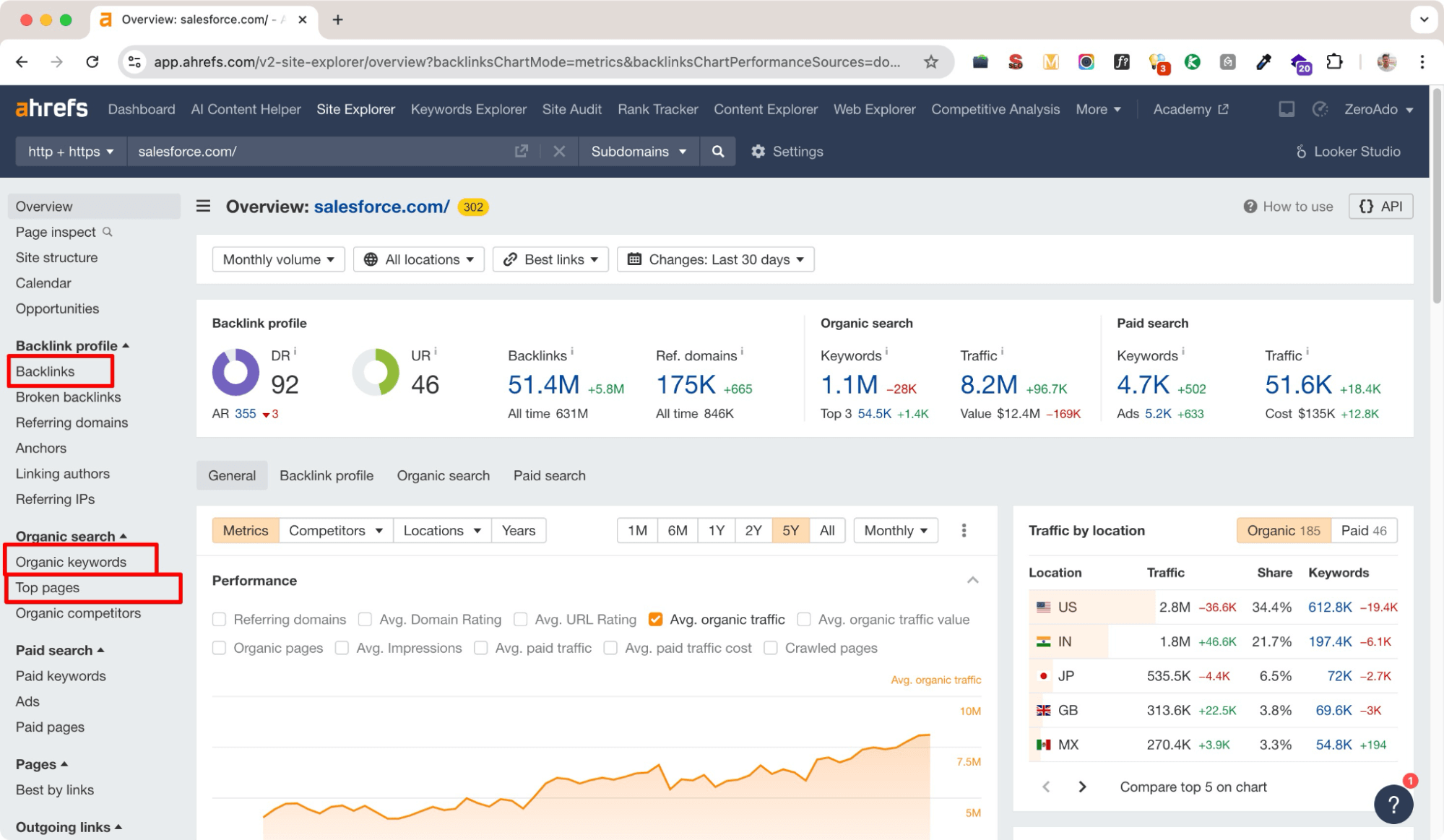
Ahrefs’ Site Explorer tool allows you to input your competitor’s website URL and get a comprehensive overview of their website’s performance. This tool shows you important data like their organic traffic, top-ranking pages, and referring domains (backlinks). You can even see which keywords they are ranking for and how much traffic those keywords are bringing to their site.
What to look for:
- Top pages: Identify your competitor’s best-performing pages and the content that’s driving the most traffic.
- Keywords: Discover the keywords your competitors are ranking for and consider targeting the same or related keywords in your own content.
- Backlinks: See which websites are linking to your competitors, as backlinks play a crucial role in SEO. You can use this information to find new backlink opportunities for your own site.
Content Gap Tool
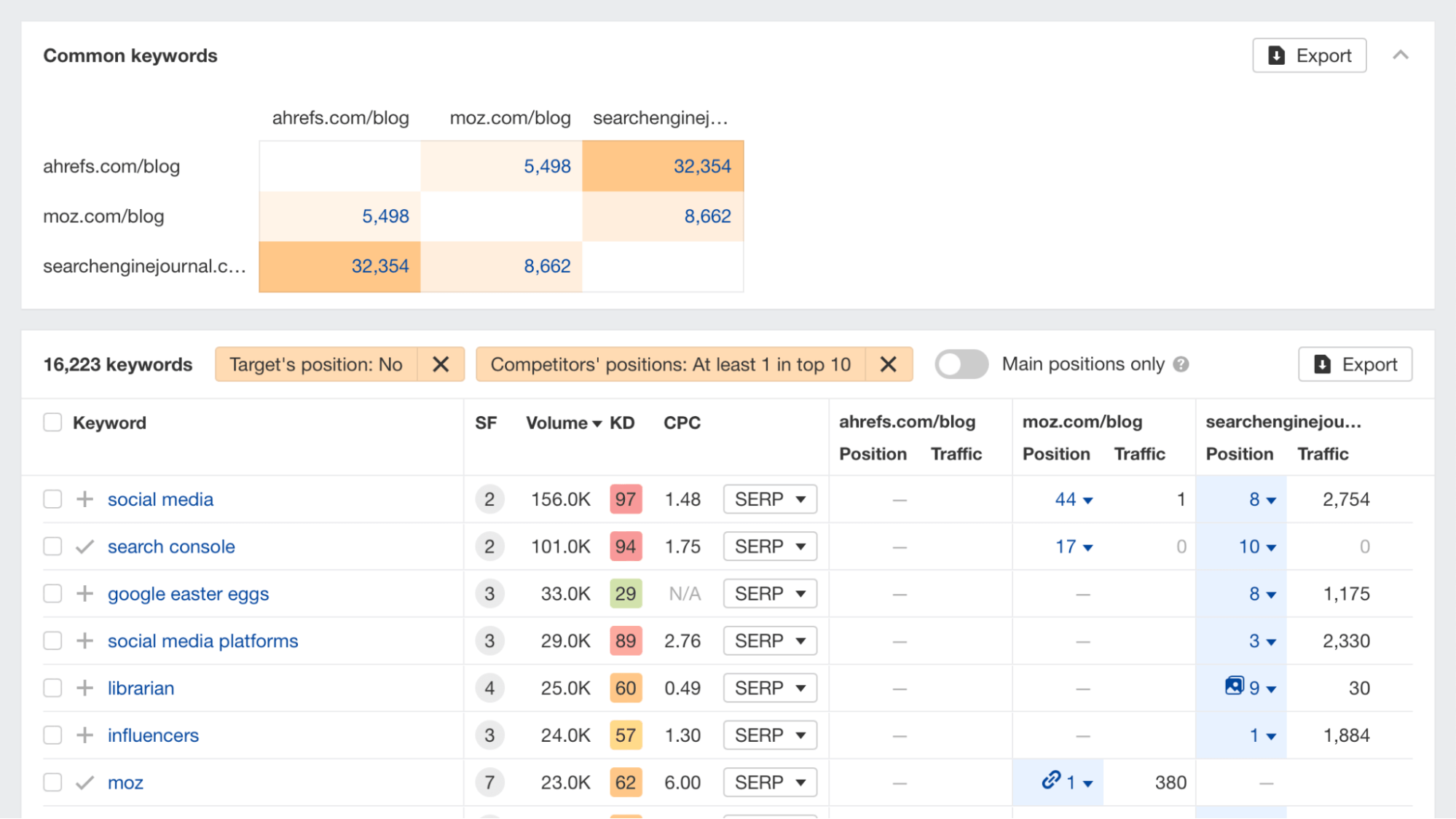
Ahrefs’ Content Gap feature helps you identify keywords that your competitors are ranking for, but you’re not. This is a powerful tool for discovering new topics and keywords you should target to close the gap between your SEO performance and your competitors.
What to look for:
- Keywords they rank for: Find the topics and keywords your competitors are targeting that you haven’t covered yet.
- Opportunity to outrank: After identifying these gaps, you can create better, more in-depth content to outperform their rankings.
Backlink Analysis
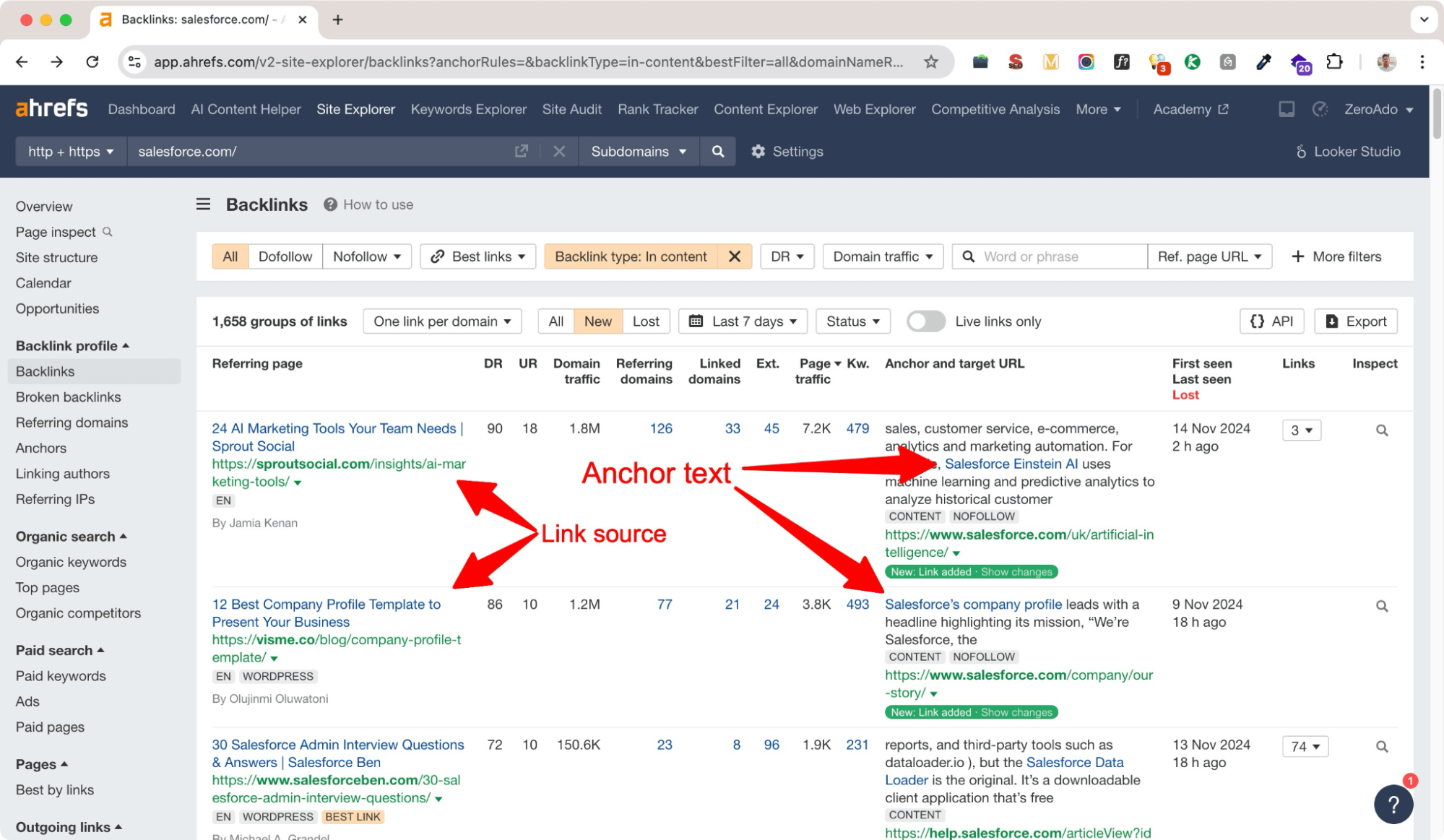
Backlinks are one of the most important ranking factors for search engines. Using Ahrefs’ Backlink Analysis tool, you can see which websites are linking to your competitors, the quality of those links, and how they might have built their backlink profile.
What to look for:
- Link sources: Identify high-quality websites linking to your competitors. You can use this information to reach out for backlinks or analyze what kind of content gets linked to.
- Anchor text: Understand what anchor text your competitors are using in their backlinks, which can help guide your own backlink strategy.
Rank Tracker
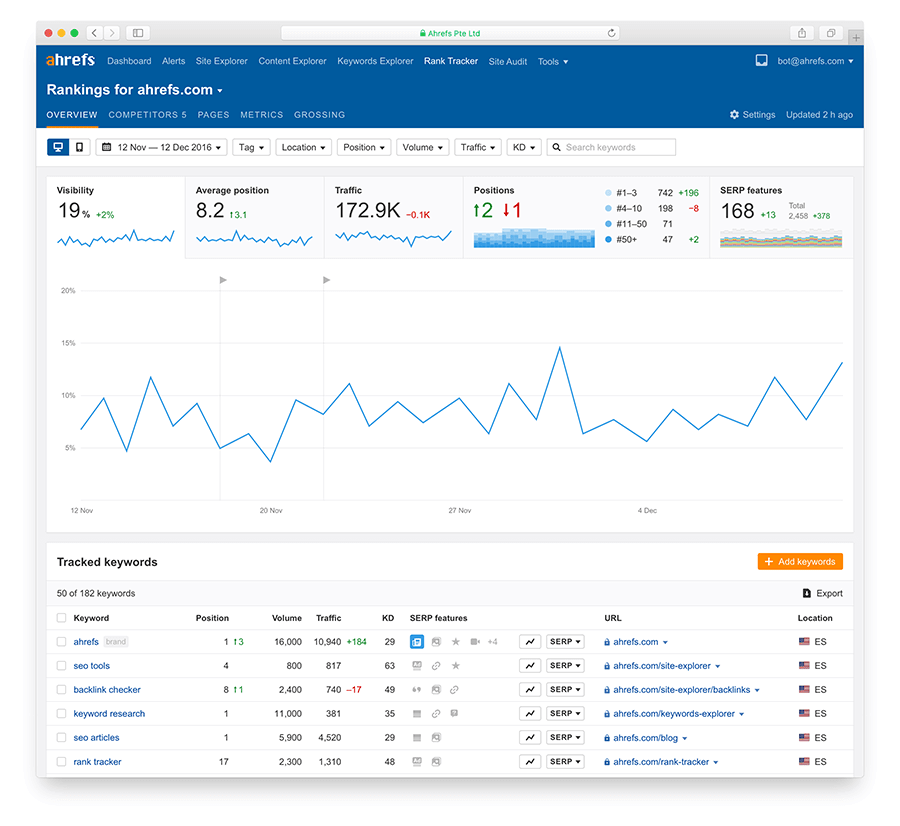
Ahrefs’ Rank Tracker tool lets you track your competitors’ keyword rankings over time. By adding your competitors’ websites and relevant keywords, you can monitor how their rankings change and how their SEO strategy is evolving.
What to look for:
- Competitor movements: See if a competitor has improved its ranking for a specific keyword and understand why. This can give you ideas on what strategies or tactics to adopt.
I believe you’re getting the hang of how Ahrefs works! These Ahrefs tools provide invaluable insights into your competitors’ SEO tactics, reveal new keyword opportunities, and uncover potential backlink sources. Using these insights will empower you to build a stronger, more effective SEO strategy that helps you rank higher than your competition in search results.
Create a keyword lists and conduct keyword research
Once you have an idea of who your audience is and what your competitors are doing, build a list of keywords that are relevant to your SaaS product and its features. Use SEO tools like Ahrefs, SEMrush, or Google Keyword Planner to find keywords that have decent search volume and low competition.
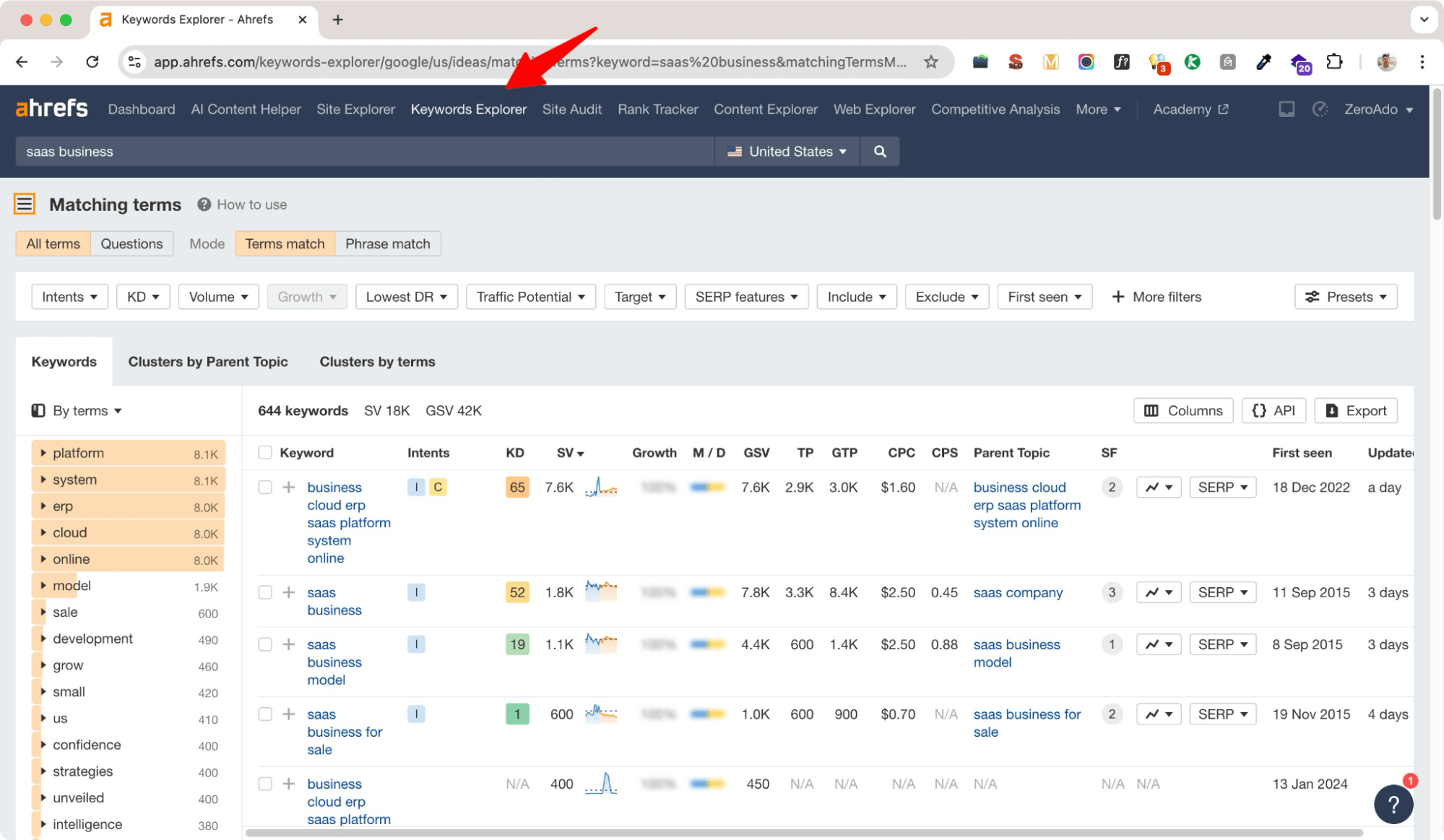
Aim for a mix of short-tail keywords (broad terms) and long-tail keywords (more specific phrases) that align with your audience’s search intent. This research will lay the foundation for your content and SEO efforts.
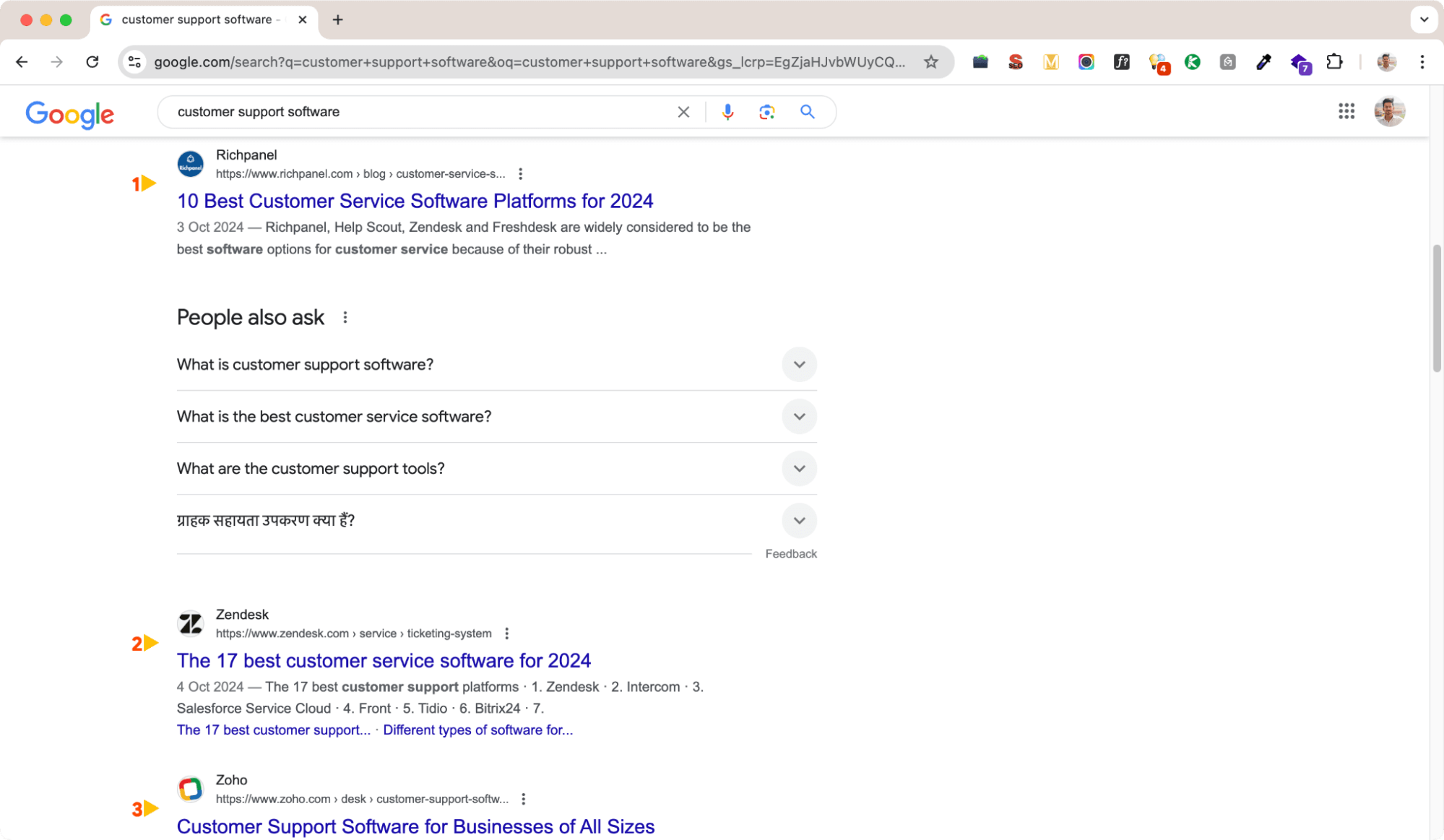
To understand this better let’s see how Zendesk, a customer service software (CSaaS) provider, approaches their keyword strategy. They use short-tail keywords like “customer support software” to reach a broad audience and increase their general visibility.
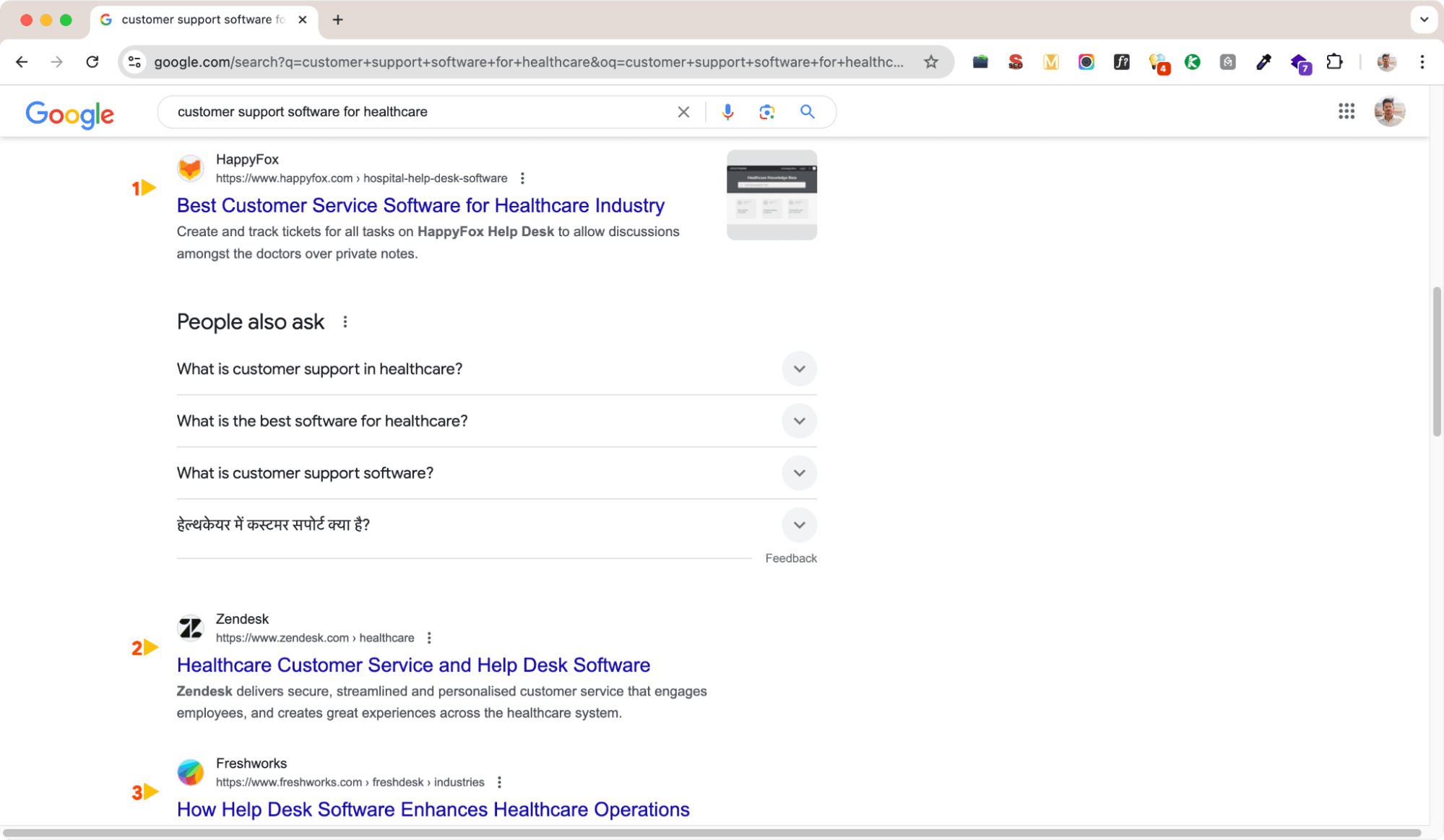
But they don’t stop there, they also target long-tail keywords such as “best help desk software for startups” or “customer support software for healthcare.” These more specific phrases allow Zendesk to connect with users who have particular needs or are looking for a customized solution.
By using a combination of broad and specific keywords, Zendesk reaches a wide range of people, from those just starting to look into customer service options to those with specific needs. This strategy helps Zendesk increase visibility, attract the right audience, and ultimately drive conversions.
For your SaaS business, adopting a similar keyword approach can position you strongly in search results, connecting you with both casual browsers and high-intent customers. It’s a smart way to strengthen your online presence and grow sustainably without relying heavily on paid ads.
Create and optimize content better than your competitors
Content is at the heart of any SEO strategy, so it’s essential to create valuable, high-quality SEO content. Start by producing content that addresses the needs and questions of your target audience.
Use the list of keywords that you’ve built through your keyword research process. Now, focus on creating content that provides more depth, clarity, and value to the users than what your competitors are offering.
Like, if a competitor has a general article on a topic, you can try going a step further by creating a detailed guide or adding unique insights that set your content apart. Also, don’t forget to optimize for keywords, and include relevant visuals and clear calls-to-action (CTAs) to make your content more engaging and useful for your readers.
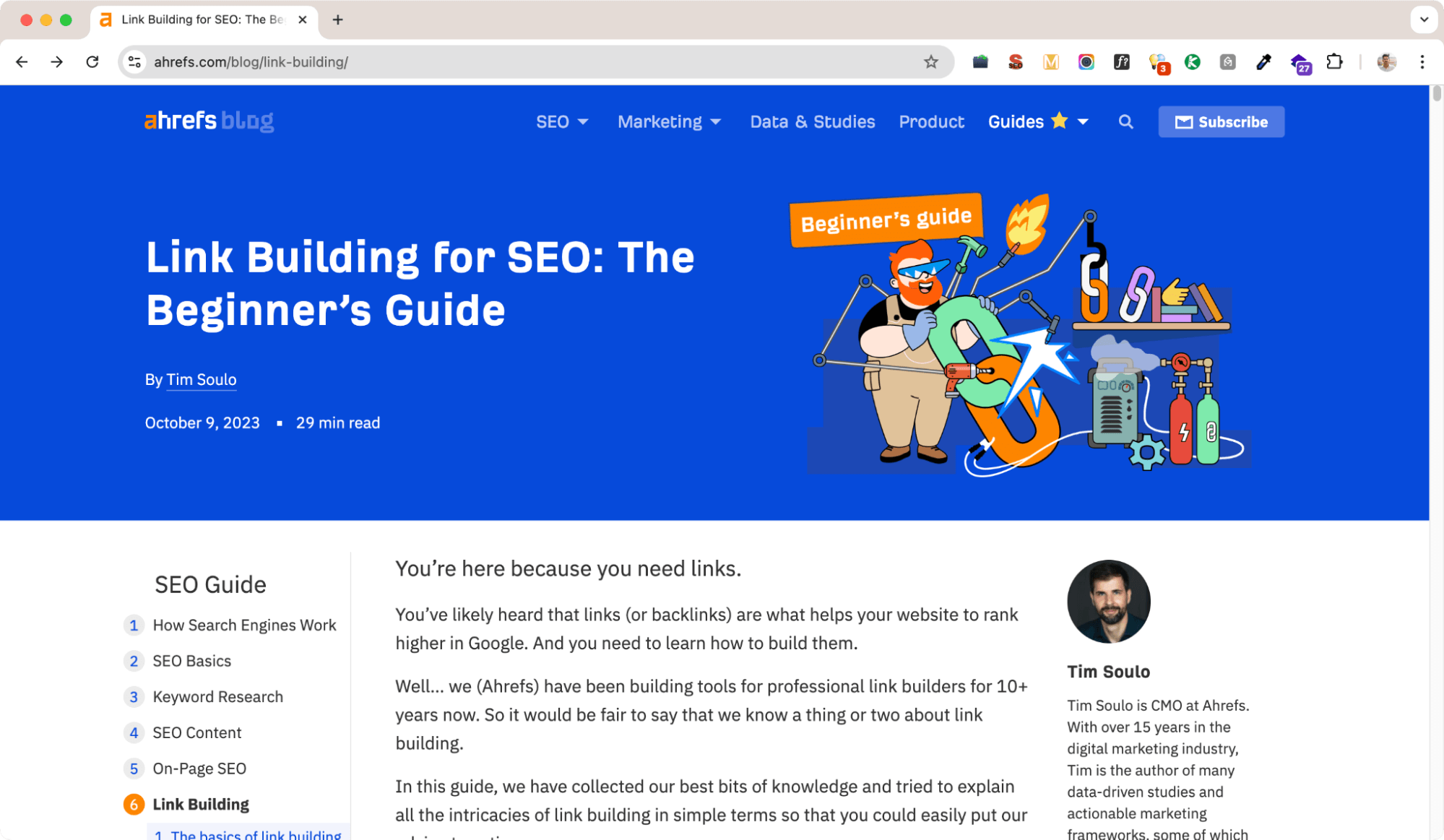
For example, Ahrefs, an SEO software company, often takes complex SEO topics and breaks them down into highly detailed, practical guides. For instance, rather than just writing a general article on “backlink building”, they’ll dive deep into the subject with step-by-step tutorials, real-world examples, and actionable strategies that readers can immediately apply.
This level of depth and usability in their content helps them rank above competitors and builds a loyal following among SEO professionals.
By taking inspiration from this approach, you can create content that not only helps you rank higher but also keeps visitors on your site longer, which signals value to search engines and positions your brand as a leader in the SaaS space.
Check for on-page SEO and Technical SEO
Once your content is ready, make sure it’s optimized for on-page SEO elements like titles, meta descriptions, header tags, and image alt tags. Also, focus on technical SEO, ensuring that your website loads quickly, is mobile-friendly, has a clean URL structure, and features an updated XML sitemap.
I know these sound technical to you, but all these elements help search engines understand and index your content, which can have a big impact on your search rankings. If handling these aspects seems overwhelming, you might want to consider working with the best SEO company suited to your business needs. They can manage these details, help improve your visibility, and free up your time to focus on other areas of your business.
Build high-quality backlinks
Backlinks (links from other websites to yours) are a major factor in SEO rankings, so focus on building high-quality links from reputable websites. To do this, consider strategies like guest blogging, creating shareable content, and reaching out to industry sites for link-building opportunities.
For example, here at ZeroAdo, we are always building quality backlinks for both our clients and ourselves. In the screenshots provided below, you’ll see examples of backlinks we’ve secured for clients across high-authority domains, along with each domain’s Domain Rating (DR) for transparency and credibility.
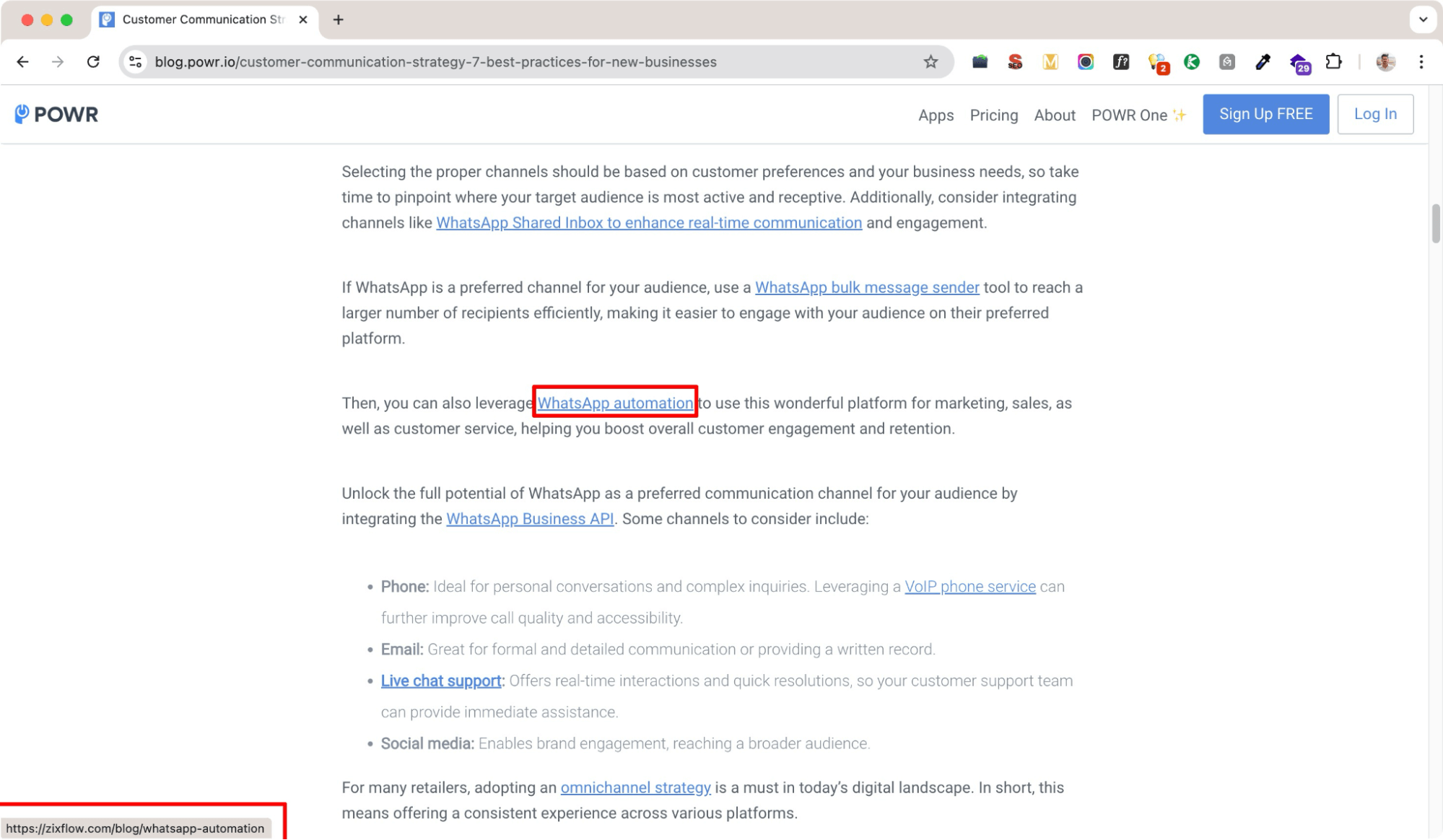
In the above screenshot, as you can see we created a backlink for one of our clients, Zixflow, on powr.io, a site with an impressive DR of 87.

Another example shows our work with MyOperator, where we secured a backlink on G2.com, a high-quality site.
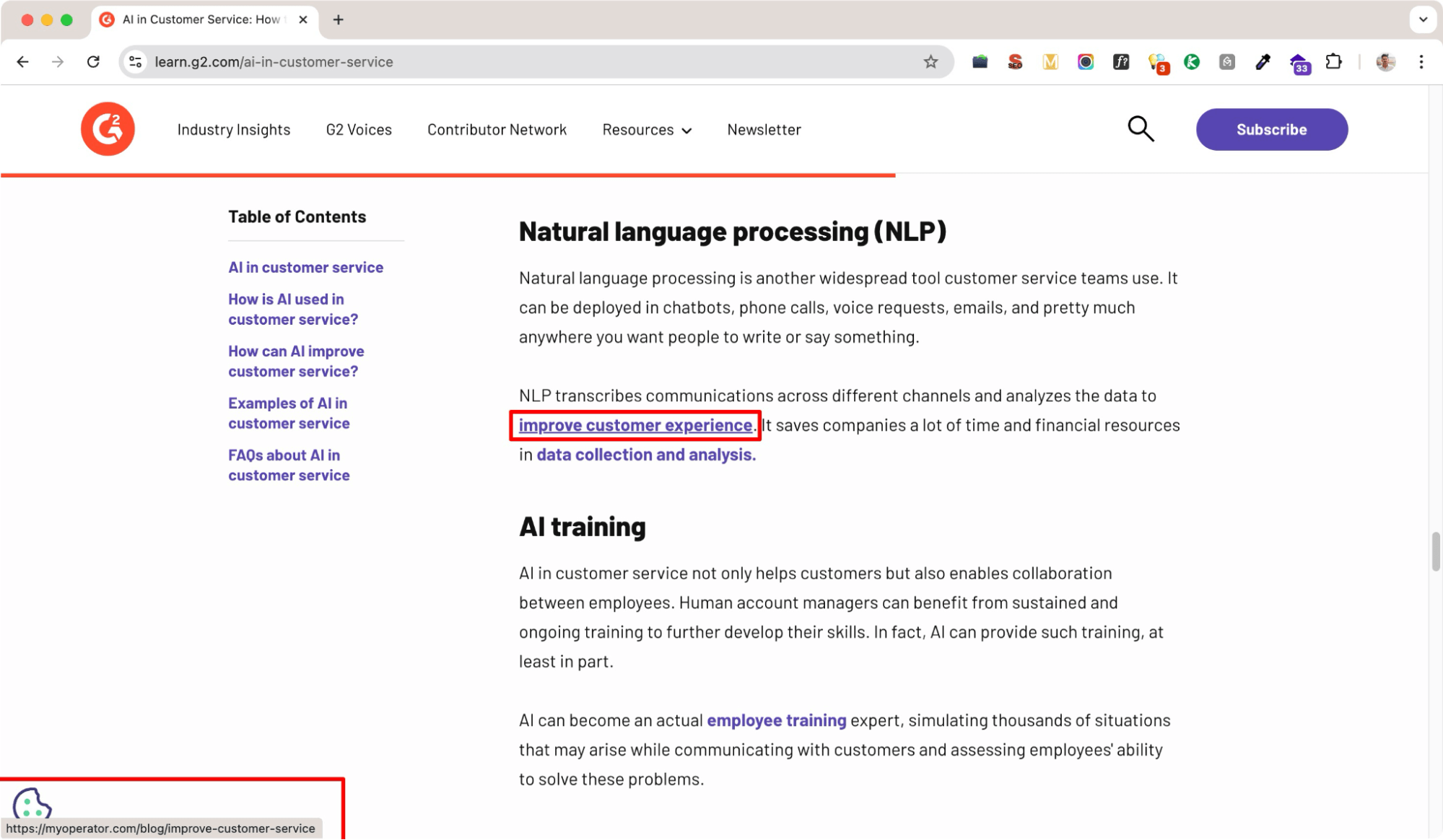

Finally, for our client AM2PM Support, an outsourcing company, we ensured a quality link that aligns with their industry and boosts their online authority.
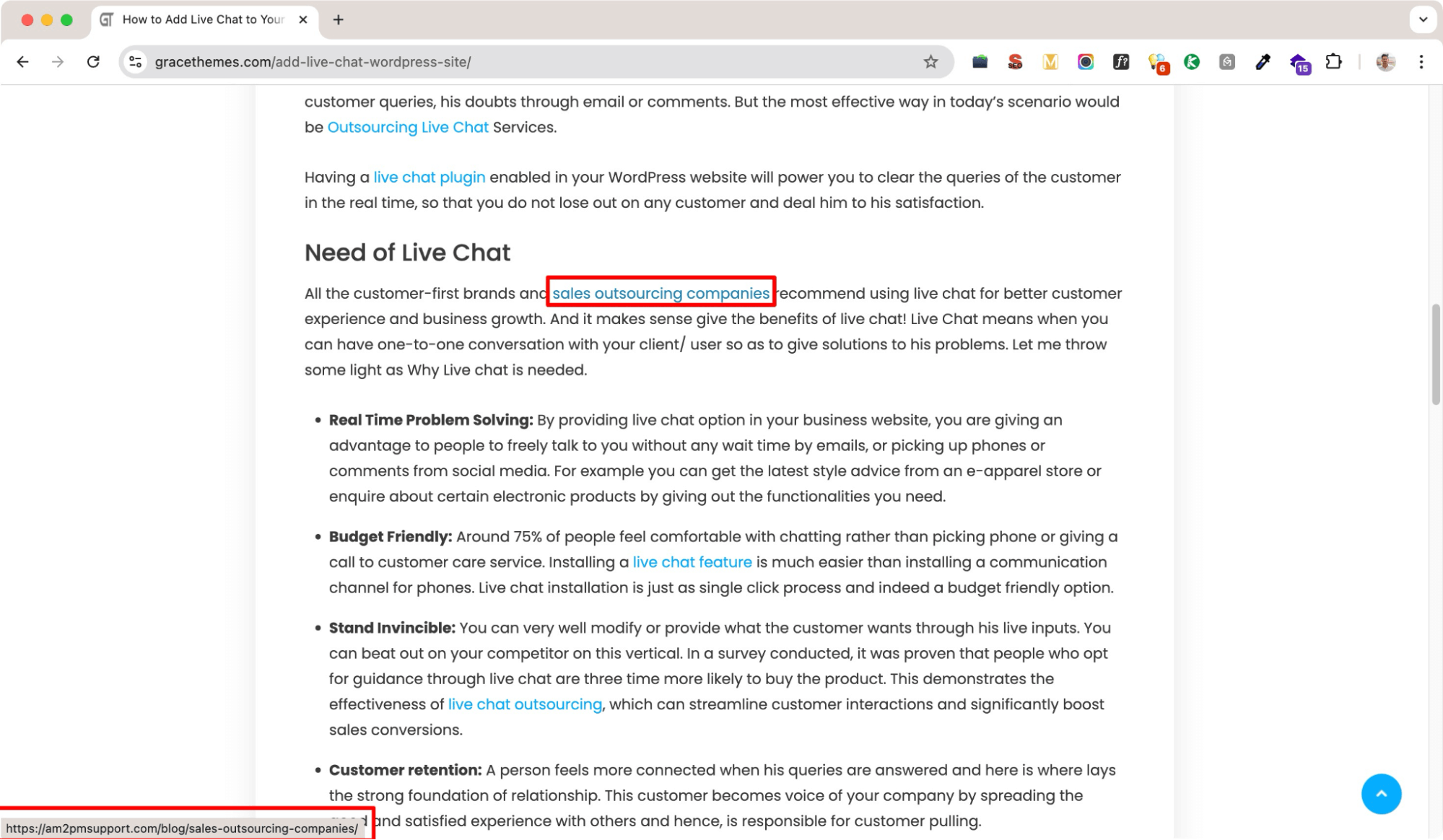

Quality is more important than quantity, so aim for backlinks from sites that are relevant to your industry and have good authority. High-quality backlinks signal to search engines that your site is credible and authoritative.
Use SEO tools to track and improve
Yes you read it right. Because SEO isn’t a one-time task, it’s an ongoing process. Use B2B SEO tools like Google Analytics, Google Search Console, Ahrefs, or SEMrush to monitor your website’s performance, identify areas for improvement, and uncover new opportunities.
These tools help you track metrics like organic traffic, keyword rankings, bounce rates, and user behavior on your site. Regular tracking ensures that your efforts are effective and provides data to make informed adjustments.
Rank tracking, monitoring, and constantly making updates
SEO is always evolving, and your rankings can change due to algorithm updates or new competitors. Regularly track your keyword rankings and monitor your content’s performance to stay competitive.
Don’t hesitate to update your content to keep it relevant and valuable. Updating older articles/blogs, expanding on popular topics, and continuously refining and adjusting your strategy based on data will help your SaaS business stay visible and continue growing in the search engine results.
Few more bonus steps to level up your SaaS SEO
So, everything you’ve read so far, you might find some similar heading in other blogs. But since you’re reading this at ZeroAdo, let me share some bonus tips that can really make a difference for you!
Directory listings – list your SaaS in directories
Adding your SaaS product to popular directories can increase your brand’s visibility and build high-quality backlinks. Look for industry-specific directories or lists (like G2, Capterra, and Product Hunt) that your target audience might browse when searching for software solutions.
Being present in these directories can drive more traffic to your site and help search engines see your SaaS as a credible player in the industry.
Collect reviews on directories and platforms like Google Business – more reviews more authority
Encourage your satisfied customers to leave reviews on directories and platforms like Google Business. Positive reviews not only help establish trust with potential customers but also strengthen your SEO.
More reviews can boost your online authority, as Google and other search engines view positive feedback as a sign of reliability. Make it easy for users to review your product and consider adding a prompt after successful customer interactions.
Don’t forget social signals – create a buzz around your niche on social media
Social media links are often “nofollow,” but creating a buzz on platforms like LinkedIn, Twitter, and Facebook can indirectly impact SEO. Regularly share valuable content, product updates, and insights that resonate with your target audience.
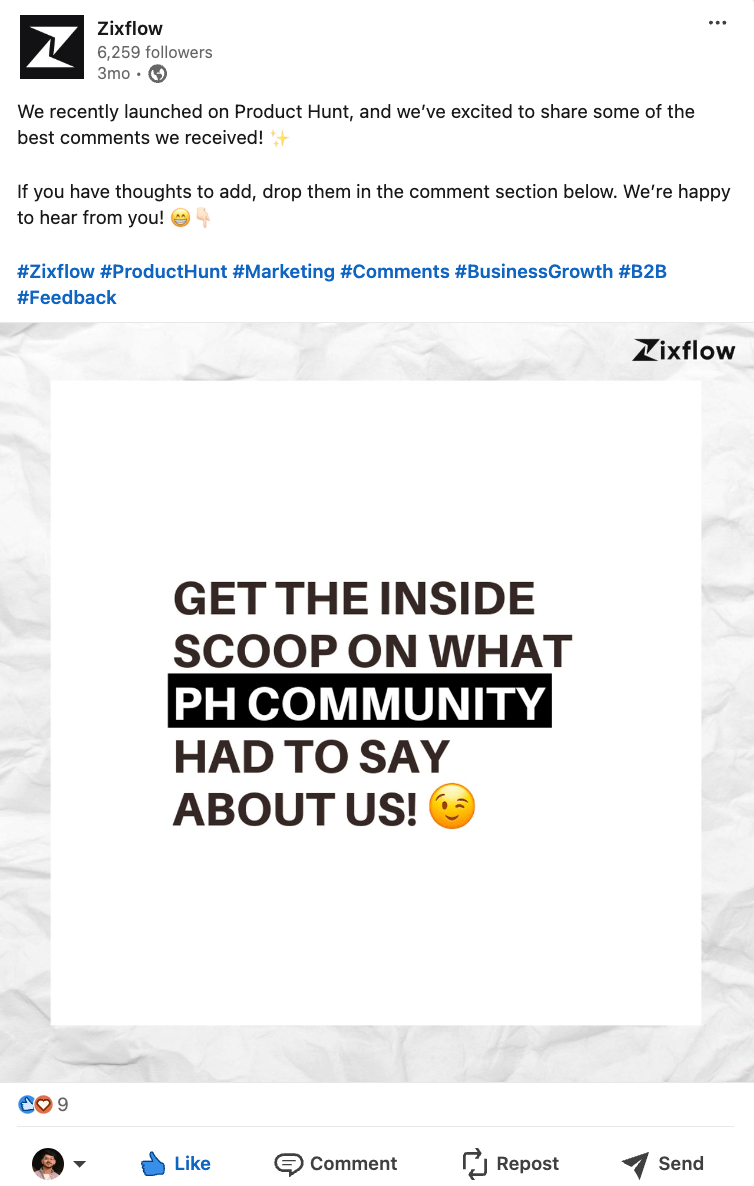
When users engage with your posts, it amplifies brand awareness and can lead to more organic searches for your SaaS product. Social proof also demonstrates your brand’s relevance and authority in your niche, which can benefit your SEO efforts overall.
Leverage answer platforms like Quora and Reddit
Platforms like Quora and Reddit are great for sharing your expertise and linking back to your site when it’s relevant. While these links are “nofollow,” participating in discussions can still boost your brand’s visibility and website authority.
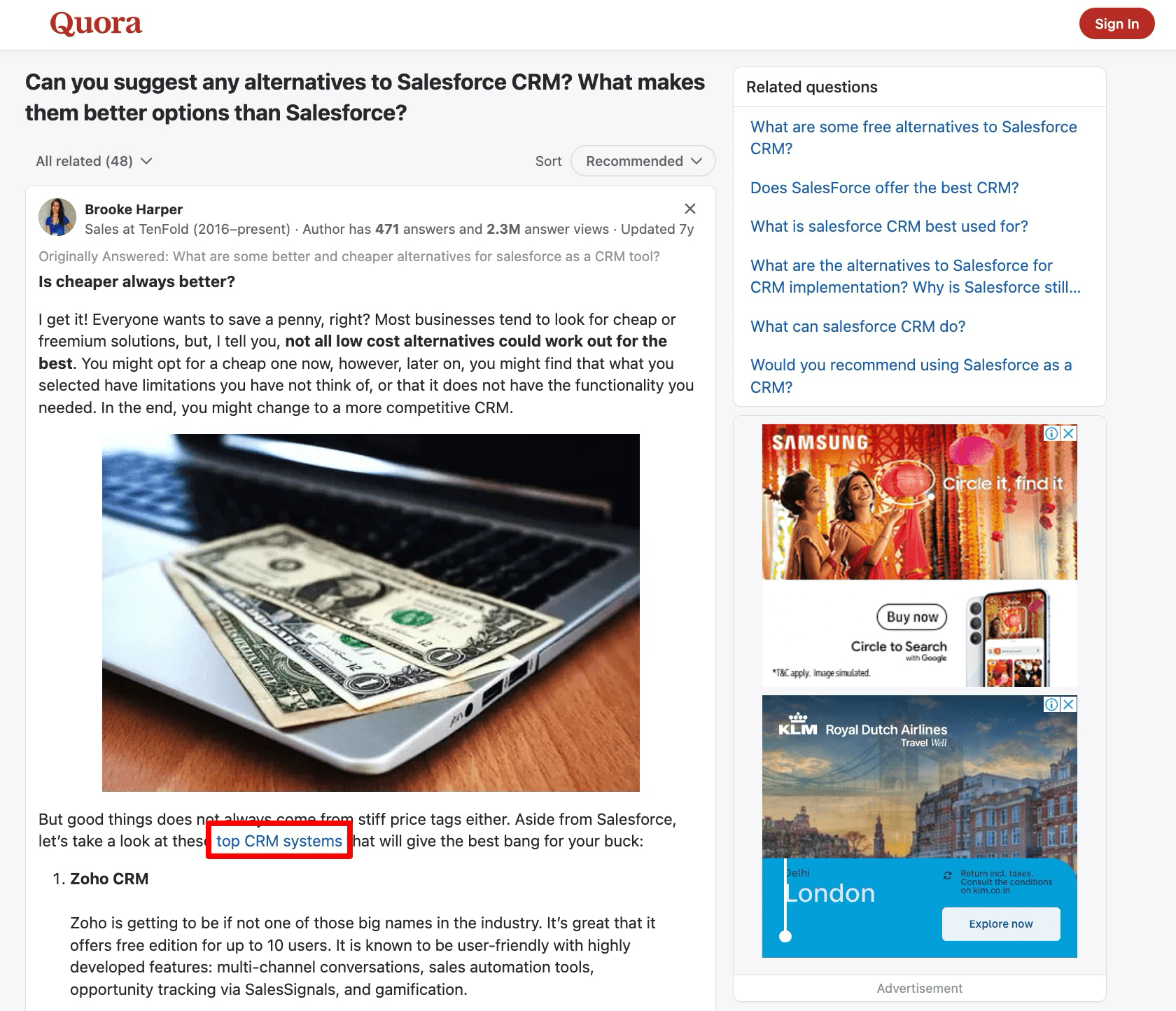
By answering questions and joining conversations related to your SaaS niche, you can establish your brand as a trusted resource. Additionally, mentions on these platforms create valuable visibility and can drive traffic that boosts overall engagement on your website.
Start building your SaaS SEO strategy and make your SaaS business stand out
As more and more SaaS products and services launch every day, standing out in this competitive market requires consistent effort and well-planned strategies.
By implementing the right SEO strategies, you can increase visibility, attract qualified leads, and build long-term success. The earlier you start, the sooner you’ll see results. But remember, SaaS SEO isn’t just a one-time effort, it’s an ongoing process of improvement and adaptation.
Keep refining your strategies, stay consistent, and watch your SaaS business grow organically, saving on ad spend and boosting your ROI. If you’re new to SaaS SEO or need expert guidance, consider partnering with a reputed SaaS SEO agency – ZeroAdo.
Our team of experts at ZeroAdo have years of industry experience and we’re capable enough to turn your SaaS into a recognized brand, of course with quality leads.
So why wait for success to find you? Take the first step toward a stronger online presence.
Contact us today to learn how we can help your SaaS business achieve growth and make an impact.
Think growth ? Think ZeroAdo ?
Frequently asked questions – SaaS SEO
What are the best SaaS SEO strategies?
The best SaaS SEO strategies include keyword research (targeting both short-tail and long-tail keywords), optimizing on-page SEO, creating valuable and relevant content, focusing on technical SEO, building high-quality backlinks, and ensuring your site is mobile-friendly. Additionally, you should continuously monitor performance, track keyword rankings, and adjust strategies based on analytics.
How to do SEO marketing for a SaaS business?
SEO marketing for a SaaS business involves aligning your content with what your target audience is searching for, using proper keyword research tools, optimizing your website for search engines, and building backlinks to boost your authority. Regularly update your content, ensure technical SEO best practices are followed, and measure the effectiveness of your SEO strategy.
What kind of SEO approach and strategy should I use in a B2B SaaS platform?
For a B2B SaaS platform, a focused SEO approach targeting long-tail keywords, creating in-depth case studies, and blog content that resonates with businesses is essential. It’s also important to target high-intent keywords that attract decision-makers and to leverage LinkedIn and other professional networks for additional visibility.
What SEO tactics do you use to increase the traffic to your B2B SaaS website?
Key tactics include keyword research (especially for long-tail and low-competition keywords), optimizing your landing pages, focusing on content marketing, earning quality backlinks from relevant sources, leveraging testimonials, and working on improving the site’s speed and user experience. Don’t forget to optimize for featured snippets and leverage SEO tools for tracking.
How do I find some good SaaS SEO recommendations?
You can find SaaS SEO recommendations by following industry blogs (like Ahrefs, Moz, and SEMrush), attending webinars, and looking for case studies. You can also get recommendations by networking with other SaaS founders or hiring experienced SEO agencies that specialize in SaaS SEO.
What is a good SEO tip for SaaS companies?
A great SEO tip for SaaS companies is to focus on creating high-quality, informative content that answers the questions your target audience is asking. In addition to this, make sure your site’s technical aspects (like site speed, mobile optimization, and user experience) are fully optimized.
What SEO strategies have you found most effective for SaaS growth?
The most effective strategies for SaaS growth include creating content that provides value to your audience, using tools like Ahrefs to identify content gaps, and focusing on keyword optimization with a solid on-page SEO strategy. Building a strong backlink profile, optimizing for local SEO, and using data-driven insights are also key.
How important is SEO in a SaaS business?
SEO is crucial for SaaS businesses as it helps drive organic traffic, which in turn leads to more conversions and growth. Without SEO, you could be relying solely on paid ads to generate leads, which can get expensive. SEO provides long-term results, builds trust with your audience, and establishes your brand as an authority in your field.
How to improve SEO for SaaS companies?
To improve SEO for SaaS companies, you should start with thorough keyword research to target the right keywords. Optimize your website’s technical aspects, create high-quality content that addresses your users’ needs, ensure fast load times, and work on building backlinks. Don’t forget to monitor your rankings and adjust your strategy as needed.
